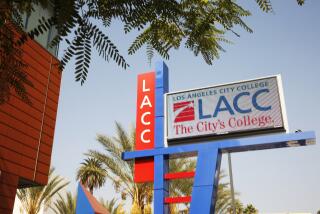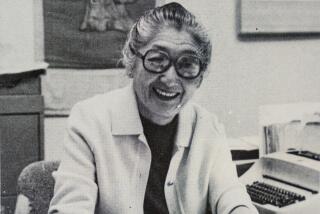Honoree Worked With Disabled Students : Scholarship Pays Tribute to Victim of AIDS
- Share via
During most of the last year of his life, Sol Whitlow did not tell many people he had AIDS.
He feared rejection, his friends and co-workers say, and he only talked about dying with an intimate group of people.
Now friends remember Whitlow as a diligent, friendly man who thrived on his work with disabled students at Santa Monica College. And in his memory, the college has set up a scholarship fund for disabled students--possibly the first college scholarship in Southern California to honor an AIDS victim, according to college officials.
Whitlow, 44, died Sept. 10. For the last three years, he worked as a secretary and counselor at the Disabled Students Center of Santa Monica College.
He was the first point of contact for many of the some 500 students who seek help at the center, according to coordinator Judy Schwartz. It was Whitlow who often determined what kind of assistance a student needed, whether it be note-takers, readers, friendly advice or just a shoulder to cry on.
‘A Wonderful Smile’
“He had a wonderful smile, a kind sense of humor,” Schwartz said. “In an office where everyone is disabled, with problems, it’s an important quality to be able to laugh and see humor in things.”
Whitlow also had a wonderful gift of gab, Schwartz said, able to converse with just about anybody over just about anything, from religion to politics to the Lakers.
But behind the cheerful exterior, Whitlow was apparently grappling with his illness. Following the pattern that commonly plagues a victim of acquired immune deficiency syndrome , one sickness after another befell Whitlow, Schwartz said. As he recovered from a rash, he’d get a cold, then other maladies.
People soon suspected Whitlow had AIDS, even though he chose not to talk about it.
“He didn’t want anybody to know,” said Sam Huizar, a friend of Whitlow’s and fellow assistant in the Disabled Students Center. “He was afraid they might discriminate against him or turn against him.”
The fears, Huizar said, were unfounded.
However, another of Whitlow’s friends, Pat Brown, said that Whitlow had heard enough anti-gay comments on the job to make him leery of mentioning the disease. Brown and Whitlow knew each other for about 22 years, she said, and he had often referred to her jokingly as an adopted sister.
Brown, a nurse, said Whitlow attended a “life, death and transition” workshop in Oregon a year before he died, and the experience helped him prepare for death.
“We talked a lot about the disease, about dying,” Brown, 49, said. “To walk with someone on this journey . . . is a growing experience.”
Whitlow was in and out of the hospital for about 4 months before he died, according to Schwartz and Huizar. He became well enough at one point to go back to his home in Indiana to see his family but was hospitalized soon after returning to Los Angeles.
His final days were spent in a special unit that cares for patients with AIDS and other immune-system disorders at Midway Hospital on San Vicente Boulevard. The unit is relatively new and one of only a handful that specializes in this kind of care; nurses are handpicked for their ability and interest in working with AIDS patients, visiting hours are round-the-clock and numerous support services are offered.
Through therapy, Whitlow regained enough strength to return home, and he died the next day, Schwartz said.
The Disabled Students Center then took up the cause of establishing a scholarship fund. About $600 has been raised so far in two bake sales, and other fund-raising activities are planned, Schwartz said.
For the staff at Santa Monica College, Whitlow’s illness and death in many ways opened the question of how to deal with AIDS on campus. The board of trustees has since adopted a formal policy banning discrimination against sufferers of AIDS or AIDS-related complex. An AIDS Task Force has also been set up.
Four students with AIDS have come to the Disabled Students Center over the last 2 years, and officials say there are questions over how much accommodation is to be made for AIDS-infected students.
Schwartz said she hopes that Whitlow’s death will make people at the college realize they should not fear losing their job or medical benefits or friends because they have AIDS.
“When I think of what Sol went through by not telling us. If we had known it would have (been easier) for him,” Schwartz said. “There are always going to be people who are frightened or judgmental but . . . we want to talk openly about AIDS. At Santa Monica College, we don’t want AIDS to be a whispered thing.”
More to Read
Sign up for Essential California
The most important California stories and recommendations in your inbox every morning.
You may occasionally receive promotional content from the Los Angeles Times.














